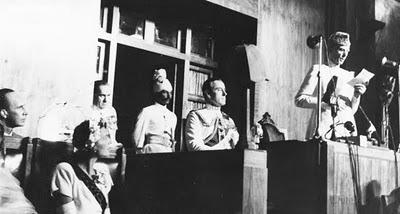On August 11, 1947 Muhammad Ali Jinnah was chosen as the first president of the Constituent Assembly of Pakistan. In his first Presidential address to the assembly he outlined the framework and the tasks of the assembly in order for Pakistan to succeed. Let analyze how much we have accomplished since.

“Mr. President, Ladies and Gentlemen
I cordially thank you, with the utmost sincerity, for the honour you have conferred upon me — the greatest honour that is possible for this Sovereign Assembly to confer — by electing me as your first President. I also thank those leaders who have spoken in appreciation of my services and [thank them for] their personal references to me. I sincerely hope that with your support and your co-operation we shall make this Constituent Assembly an example to the world. The Constituent Assembly has got two main functions to perform. The first is the very onerous and responsible task of framing the future constitution of Pakistan and the second of functioning as a full and complete sovereign body as the Federal Legislature of Pakistan. We have to do the best we can in adopting a provisional constitution for the Federal Legislature of Pakistan. You know really that not only we ourselves are wondering but, I think, the whole world is wondering at this unprecedented cyclonic revolution which has brought about the plan of creating and establishing two independent Sovereign Dominions in this sub-continent. As it is, it has been unprecedented; there is no parallel in the history of the world. This mighty sub-continent with all kinds of inhabitants has been brought under a plan which is titanic, unknown, unparalleled. And what is very important with regard to it is that we have achieved it peacefully and by means of an evolution of the greatest possible character.”
Jinnah while remarking the unprecedented revolution that created Pakistan, outlined that the structure of the government should be federal with provinces having great autonomy. Jinnah had already promised Bahawalpur, Kalat, Chitral and several other states with automous powers in the upcoming Constitution.
However it took Pakistan 9 years to draft the first, another 17 years to the constitution we currently have. However none of them had provincial autonomy. That was rectified in 2010 with the 18th amendment. However this amendment still fell short on the promises to princely states which are yet waiting for the fulfillment of Quaid’s promise.
“Dealing with our first function in this Assembly, I cannot make any well-considered pronouncement at this moment, but I shall say a few things as they occur to me. The first and the foremost thing that I would like to emphasize is this: remember that you are now a Sovereign Legislative body and you have got all the powers. It therefore places on you the gravest responsibility as to how you should take your decisions. The first observation that I would like to make is this: You will no doubt agree with me that the first duty of a government is to maintain law and order, so that the life, property and religious beliefs of its subjects are fully protected by the State.”
“Heavy is the head that wears the crown” and Jinnah was well-aware of it. He emphasized to the assembly that they have to use their powers for the welfare of the people and it’s their responsibility to make decisions that would not warm anyone. He prioritized the importance of property, lives and religious believes of the citizens of the new-born nation.
As it seems, we did a little of that front too, despite have many legislation passed, Pakistan is still not a safe place to live, the number of daily crimes keep climbing to a level that military operations in civilian area are considered normal. The decisions made the governments have led the country in to abyss of terrorism where we have lost thousands in lives and billions in property. The issue of religious believes would be discussed below.
“The second thing that occurs to me is this: One of the biggest curses from which India is suffering — I do not say that other countries are free from it, but I think our condition is much worse — is bribery and corruption. That really is a poison. We must put that down with an iron hand, and I hope that you will take adequate measures as soon as it is possible for this Assembly to do so.”
Jinnah considered “bribery and corruption” as the poison to the nation and asked that it must be dealt with a iron-hand.
Despite some political cases and namesake punishments, billions in swiss banks, foreign properties and even the “kharcha pani” paid even for a legal work tells us that we still haven’t moved an inch.
“Black-marketing is another curse. Well, I know that black-marketeers are frequently caught and punished. Judicial sentences are passed, or sometimes fines only are imposed. Now you have to tackle this monster, which today is a colossal crime against society, in our distressed conditions, when we constantly face shortage of food and other essential commodities of life. A citizen who does black-marketing commits, I think, a greater crime than the biggest and most grievous of crimes. These black-marketeers are really knowing, intelligent, and ordinarily responsible people, and when they indulge in black-marketing, I think they ought to be very severely punished, because they undermine the entire system of control and regulation of foodstuffs and essential commodities, and cause wholesale starvation and want and even death.”
Smuggling and black-marketing were two more menaces described by Jinnah. These lead to a crumbling economy and high prices for basic commodities like food and water. Importantly Jinnah also mentioned that weaknesses in the judicial system where culprits are not properly punished and they get away with a mere slap on the wrist.
In the last decade we have seen 10+ cases of high-scale black-marketing which added billions to the pockets of wealthy factory owners who hoarded basic items of food like sugar, wheat and rice, later on sold them on 6 to 7 times the original prices. Shortage of water and tanker mafia in major cities of Pakistan is just another of many examples. On the judicial account, there are literally millions of cases awaiting justice, poor and weak spend generations let alone all their hard-earned money on these cases. On the other hand, rick and powerful, even terrorists captured are often released on the basis of technicalities of the law.
“The next thing that strikes me is this: Here again it is a legacy which has been passed on to us. Along with many other things, good and bad, has arrived this great evil — the evil of nepotism and jobbery. I want to make it quite clear that I shall never tolerate any kind of jobbery, nepotism, or any any influence directly or indirectly brought to bear upon me. Whenever I will find that such a practice is in vogue or is continuing anywhere, low or high, I shall certainly not countenance it.”
Another inherited vice Jinnah mentions is jobbery (corrupt employment practices) and nepotism. He categorical made it clear that any such attempt, if brought to him, will be result in a heavy reparation.
Today we have made it into a norm. For any employment ranging from a watchman to the minister, you either need to be related to someone in power or have them “make a call”. We have seen examples of cabinets and high ranks in all institutes filled with relatives, friends or the people who would be beneficial to the hiring authority themselves instead of choosing on merit.
“I know there are people who do not quite agree with the division of India and the partition of the Punjab and Bengal. Much has been said against it, but now that it has been accepted, it is the duty of every one of us to loyally abide by it and honourably act according to the agreement which is now final and binding on all. But you must remember, as I have said, that this mighty revolution that has taken place is unprecedented. One can quite understand the feeling that exists between the two communities wherever one community is in majority and the other is in minority. But the question is, whether it was possible or practicable to act otherwise than what has been done. A division had to take place. On both sides, in Hindustan and Pakistan, there are sections of people who may not agree with it, who may not like it; but in my judgement there was no other solution, and I am sure future history will record its verdict in favour of it. And what is more, it will be proved by actual experience as we go on that that was the only solution of India’s constitutional problem. Any idea of a united India could never have worked, and in my judgement it would have led us to terrific disaster. Maybe that view is correct; maybe it is not; that remains to be seen. All the same, in this division it was impossible to avoid the question of minorities being in one Dominion or the other. Now that was unavoidable. There is no other solution. Now what shall we do? Now, if we want to make this great State of Pakistan happy and prosperous, we should wholly and solely concentrate on the well-being of the people, and especially of the masses and the poor. If you will work in co-operation, forgetting the past, burying the hatchet, you are bound to succeed. If you change your past and work together in a spirit that every one of you, no matter to what community he belongs, no matter what relations he had with you in the past, no matter what is his colour, caste, or creed, is first, second, and last a citizen of this State with equal rights, privileges, and obligations, there will be no end to the progress you will make.”
Realizing the unfair treatment of Radcliffe’s award, Jinnah asked the nation to accept the decision the decision made as it was the best possible solution. Moving forward, he asked the whole nation to work together irrespective of which community the belong to, so that we make unforetold progress.
We are still divided by the caste, colour and creed, we still consider others inferior to others and take pride in defining ourselves by these criterias. Equal rights are not been given to state subject which incites the victims to rise against the federation of Pakistan. We have witnessed Bangladesh and current situation in Balochistan raises a lot of questions too. In the last decade we have progressed on this front by NFC awards, CPEC and military projects in Balochistan, merging FATA in to KPK and adding Gilgit Baltistan to national fold, but we still have a long way to go.
“I cannot emphasize it too much. We should begin to work in that spirit, and in course of time all these angularities of the majority and minority communities, the Hindu community and the Muslim community — because even as regards Muslims you have Pathans, Punjabis, Shias, Sunnis and so on, and among the Hindus you have Brahmins, Vashnavas, Khatris, also Bengalees, Madrasis and so on — will vanish. Indeed if you ask me, this has been the biggest hindrance in the way of India to attain the freedom and independence, and but for this we would have been free people long long ago. No power can hold another nation, and specially a nation of 400 million souls, in subjection; nobody could have conquered you, and even if it had happened, nobody could have continued its hold on you for any length of time, but for this. Therefore, we must learn a lesson from this. You are free; you are free to go to your temples, you are free to go to your mosques or to any other place or worship in this State of Pakistan. You may belong to any religion or caste or creed — that has nothing to do with the business of the State. As you know, history shows that in England conditions, some time ago, were much worse than those prevailing in India today. The Roman Catholics and the Protestants persecuted each other. Even now there are some States in existence where there are discriminations made and bars imposed against a particular class. Thank God, we are not starting in those days. We are starting in the days where there is no discrimination, no distinction between one community and another, no discrimination between one caste or creed and another. We are starting with this fundamental principle: that we are all citizens, and equal citizens, of one State. The people of England in course of time had to face the realities of the situation, and had to discharge the responsibilities and burdens placed upon them by the government of their country; and they went through that fire step by step. Today, you might say with justice that Roman Catholics and Protestants do not exist; what exists now is that every man is a citizen, an equal citizen of Great Britain, and they are all members of the Nation.Now I think we should keep that in front of us as our ideal, and you will find that in course of time Hindus would cease to be Hindus, and Muslims would cease to be Muslims, not in the religious sense, because that is the personal faith of each individual, but in the political sense as citizens of the State.”
Jinnah here gave the example of Britain which only rose after the Catholics and protestant stopped persecuting each other on the basis of religious discrimination. Jinnah cleared the situation by saying that the state will not and should not persecute anyone on the basis of their believes and neither that state has a right to do so.
We have seen multiple atrocities on the minorities of Pakistan. Temples burning, minorities stopped from praying, false accusations of 295 and government job advertisements asking for a specific religion for low level jobs. As Qauid warned, after them came the sects within Islam. Calling each other Kafirs, killing innocents in the name of sects, Sipah-e-Sahaba, Sipah-e-Muhammad and many other terrorist organizations were born and wreaked havoc.
“Well, gentlemen, I do not wish to take up any more of your time; and thank you again for the honour you have done to me. I shall always be guided by the principles of justice and fair play without any, as is put in the political language, prejudice or ill-will; in other words, partiality or favouritism. My guiding principle will be justice and complete impartiality, and I am sure that with your support and co-operation, I can look forward to Pakistan becoming one of the greatest Nations of the world.”
Jinnah mentioned justice and impartiality as his guiding principles, and asked for the support and same ideology for the rest of the assembly in order to make Pakistan as one of the greatest nation in the world.
Pakistanis today are filled with prejudice, we see everyone being prejudiced, from the highest courts of the law to a normal citizen, we have been fed with hatred, whether religious or geo-political, we remain baised, we still consider ourselves superior and remain biased in our decisions.
In 71 years, we have done almost nothing to make the dream of Iqbal true or to honour the wishes of Jinnah. Instead of moving forwards, we went back to the dark ages. On this August 11, lets promise that we will keep Quaid’s words in our hearts and minds and will follow them to letter. This is the only way Pakistan can become a great nation.
Pakistan Zindabad, Jinnah Paindabad.

















